- ChatGPT is a leading example of narrow AI, specializing in natural language processing and text generation, but limited to specific tasks.
- Despite its advanced capabilities, ChatGPT is not a general AI, as it lacks the ability to think independently or handle tasks beyond its designed scope.
In the rapidly evolving field of artificial intelligence (AI), ChatGPT has garnered attention for its ability to generate human-like text, participate in conversations, and assist with a variety of tasks. However, this raises an important question: is ChatGPT a narrow AI or a genaral AI?
This blog will explore why ChatGPT is considered narrow AI, and the advantages of narrow AI
Also read: What is general AI? Understanding the next evolution in AI
Also read: Narrow AI vs. general AI: What’s the real difference?
What is narrow AI?
Narrow AI, also known as weak AI, refers to artificial intelligence systems designed to perform specific tasks. It is different from artificial general intelligence (AGI), which aims to replicate human intelligence and handle a variety of cognitive tasks. Narrow AI is good at specific functions, but only for those tasks.
ChatGPT falls squarely within the realm of narrow AI. It is good at natural language processing (NLP). And it is capable of generating human-like text based on input data. It cannot think independently, perform actions beyond its programming, or adapt to entirely new situations like a human would.

Also read: What is narrow AI?
Why is ChatGPT considered narrow AI?
Although ChatGPT’s capabilities are impressive, there are several reasons to classify it as narrow AI:
- Specialization in a Single Domain: Developers design ChatGPT primarily for tasks related to text generation, language understanding, and conversation. Although it can answer questions, draft articles or assist with writing. But it cannot perform tasks outside this domain. Examples include physical actions or reasoning in a non-text environment.
- Lack of Generalization: Narrow AI systems like ChatGPT cannot transfer knowledge or apply it to completely new or unrelated problems. For example, while ChatGPT can assist in drafting a report or helping with programming tasks, it doesn’t possess the ability to navigate a complex real-world situation that requires understanding and judgment.
- Dependence on Pre-Defined Data: ChatGPT’s responses are based on patterns learned from vast datasets during training. However, it lacks common sense reasoning and cannot develop its own logic or innovative solutions. It reacts within the boundaries set by its data.
The strengths of narrow AI
Despite its limitations, narrow AI offers several advantages, making it incredibly valuable in real-world applications:
- Efficiency and Precision: Narrow AI excels at the tasks it is designed for and often outperforms humans in speed and consistency. ChatGPT, for example, can produce coherent text within seconds, making it a useful tool for content creators, marketers, and customer service teams.
- Cost-Effectiveness: Because narrow AI systems like ChatGPT focus on specific tasks, they use less computational power and can deploy at scale without requiring the massive infrastructure needed for AGI. This makes them more affordable and accessible for businesses.
- Safe and Predictable: One of the key benefits of narrow AI is that it operates within well-defined parameters. Its output can be controlled, which reduces the risks associated with AI systems behaving unpredictably. For businesses using ChatGPT, this predictability is crucial.
ChatGPT’s role in the path toward AGI
While ChatGPT is a clear example of narrow AI, it plays an important role in the broader AI landscape. Advances in language models like ChatGPT provide valuable insights into how AI can handle specific cognitive tasks, which could eventually contribute to the development of General AI.
However, achieving AGI will require significant breakthroughs beyond what ChatGPT can do today. AGI would need to reason, learn from fewer examples, and apply knowledge across diverse domains—capabilities ChatGPT currently lacks.

